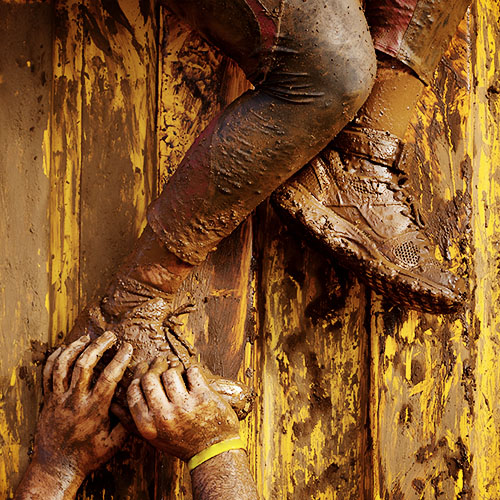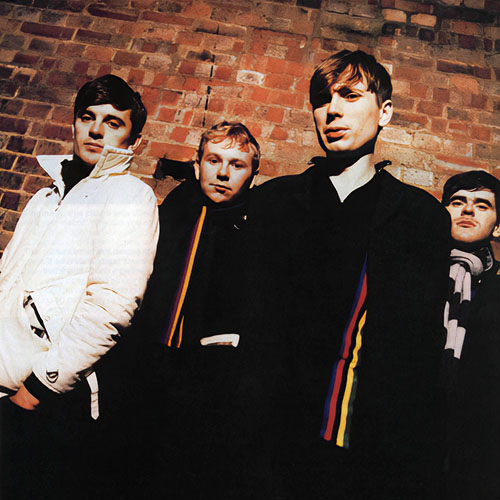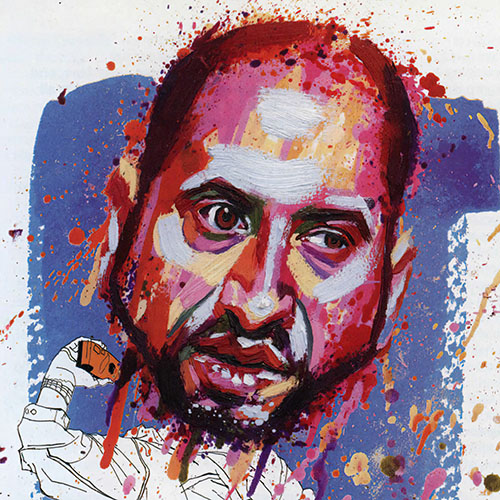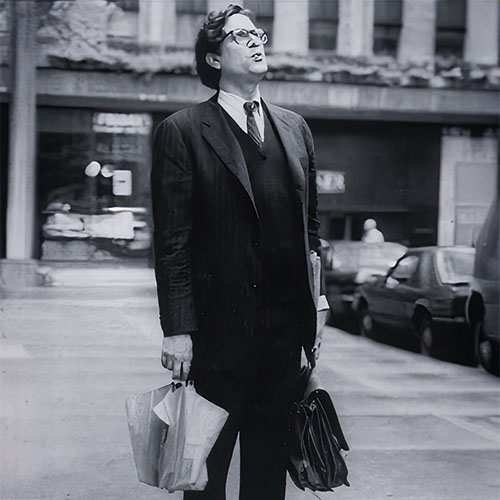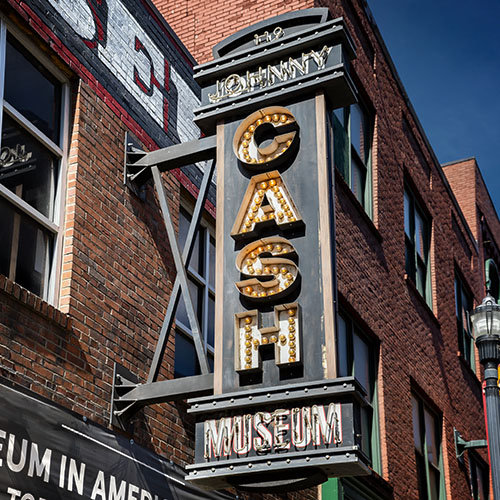“I have heard Staind fans say on many occasions how hard-core anti-country they always were, until I put out a country record.”
“Dual Citizenship” of Aaron Lewis
Staind singer Aaron Lewis has proven to be more than a little bit country and a little bit rock ‘n’ roll, with critical and commercial success in both genres.
Aaron Lewis, the 41-year-old front-man for the heavy metal band Staind — and lately a bona fide country-music singer — calls as his bus rolls across the Nevada state line: “the first civilization you come to after you drive across the salt flats from Salt Lake City,” as he puts it. He’s on the road promoting his first full-length country CD, The Road, the follow-up to his surprisingly solid EP, 2011’s Town Line, which climbed to the No. 1 spot on the Billboard Top Country Albums chart and spawned a spate of award nominations.
The idea that a metal god has “gone country” might seem bizarre, except for the fact that Lewis grew up listening to folk and country when he lived with his grandfather in New England, after his parents’ divorce. And the vulnerability and emotional turmoil that infuses his country work can be found in the brooding sensitivity that informs many of his Staind lyrics and vocals, particularly such tracks as “Epiphany” and “For You,” from the Break the Cycle album. Despite the genre-swapping, so far industry folks and fans in both musical camps have been responding with two thumbs-up.
“Now they find themselves looking for other country artists who make music like what I’m doing. There was a Twitter post that stuck out to me, where a girl was like, ‘I can’t stop listening to this new Aaron Lewis record. Does this mean that I like country?’ In the beginning, I had to fight the battle [in Nashville] of being looked at as an outsider and invader, if you will, so to hear things like that is very gratifying. It makes me feel like I’m correct in what I chose to do, and that I’m onto something.”
Still, as Lewis explains here, there are conflicts. Being Aaron Lewis, it seems, is not exactly easy.
Let’s talk a little about who you are as a person. I don’t think people really know you, apart from onstage.
Well, I’ve always felt, especially on the Staind side of things, that I exposed so much in my songs that to really let anybody in any more than that was invasive, so I didn’t let people in for a long time. I’ve always been quite guarded with my private life and family life. And I take pride in the fact that you don’t see me gracing every red carpet. By choice, I haven’t participated. So this new chapter in my life is very interesting, because country music demands so much more. The country fan wants to know you. And that’s something that I’ve kind of never allowed in the 15 years I’ve been doing this.
“My country material is a refreshing outlet. But it always leaves me with the need and the longing to write another Stains record.”
Let’s start with some basics. You’re from Massachusetts.
Actually, I was born in Vermont, and lived in New Hampshire for a while, and ended up in Massachusetts.
Whereabouts?
The Springfield area, until I had done well enough to get out of there and buy a house. And then I went back to the rural setting that I’m used to and most comfortable in. I live in a town of 1,200 people, where the stone walls are 300 years old. And so are all the trees that line the roads, and there are more farm animals than there are people. That’s the way that I prefer it, and, in my mind, the way that it should be. I can’t imagine raising my kids outside my setting. I know every kid that they go to school with. I know every parent. I pretty much know everybody in town. It takes a village to raise a child, and it also takes that village coming together to create a sense of community. And we thankfully have that. Most people these days don’t, unfortunately. We’ve completely lost social skills. People would rather text each other than pick up the phone and hear a voice.
You seem reticent to tell me the name of the town where you live.
Um, yeah. Not that I have anything to worry about, because there’s not a single person in town who will tell you where my house is. If anything, they’ll send you in the opposite direction on a wild-goose chase [laughs].
Country fans respect that, but going back several generations, people like June Carter Cash would actually invite you into their house and let you go through it. Everybody was family. You don’t see that anymore.
You’d be surprised. I’ve always done things like that. I’ve gone to barbecues. And I go out every night and sign autographs after the show. I’m guarded in my private life, but I am very approachable. After five minutes with me, people realize I’m rather boring and normal. And it probably takes a little of the mystique away. But at the same time, I really wouldn’t want it any other way.
Why did you want to venture into country music?
Country music was the first music that I ever heard. It was my grandfather’s country: Waylon Jennings, Johnny Cash, Merle Haggard, George Jones, Hank Junior and Senior, David Allan Coe. All the good stuff. My father revolted from country. He was into the folksy, singer-songwriter, acoustic-guitar-based stuff. And he was into Motown. But my grandfather was pretty hip to the times, to the country that was getting played on the radio.
Did your grandfather live long enough to see you record with George Jones and Charlie Daniels?
No, but I’m sure he was either looking down or looking up with a big smile on his face, one of the two.
When you did Town Line, were you actually in the studio with George Jones and Charlie Daniels, or did they record their tracks separately?
Unfortunately, when I was in the studio, George was under the weather. He had some sort of bronchitis. So I wasn’t there when George did his track. But I was there with Charlie, and I made a very good new friend. Me and that man see eye-to-eye on a lot of things. On most, actually.
Such as?
Such as the place that this country is in, and more on a political line of things. Me and him see pretty eye-to-eye a lot.
Well, country is essentially a conservative genre. Your songs do hit all the big traditional country themes: God, country, home, family.
That’s the reason why I feel like I fit so well in this genre. Because I was almost all by myself in the rock world in my feelings. I tended to keep them to myself a little bit more in the past.
So country music gives you an avenue of expression that Staind did not, perhaps in a more meaningful way?
Well, Staind for me was always an outlet — a purging, if you will — an ability to put into song the things that weigh on me, and that I’m not necessarily good at expressing in normal, everyday conversation. Country music for me is a way to tell stories in a more factual manner, rather than in an emotional manner. My country material is a very refreshing outlet for me. But it always leaves me with the need and the longing to write another Staind record, because what I express in Staind songs is a completely different creative vein. I mean, a heavy Staind song and one of my country songs couldn’t be more opposite.
You must have to use your voice differently between the genres.
There’s a song on The Road called “Lessons Learned.” I sing the entire song down here in my talking voice, which I had never done before. I get to use a different part of my voice with country, rather than reaching and screaming everything the way I have with Staind. The beautiful thing about it is, one makes me long for the other. And one refreshes me for the other.
Given your early years, how did you end up in rock instead of country?
Well, when I moved away from Vermont, country music stayed there with my grandfather and that side of the family. And when I moved to New Hampshire, all my friends were listening to Quiet Riot, Twisted Sister, Aldo Nova, and all that early eighties stuff. Then I moved to Massachusetts, and all my friends were into the first Motley Crue record, the first Skid Row record, Overkill, stuff like that. That was seventh and eighth grade. Once I hit high school, I reverted back to music like [Led] Zeppelin; the Doors; Crosby, Stills & Nash; and the Beatles. When I graduated high school in 1990, Nirvana and Pearl Jam really kicked the doors down for me to have any sort of opportunity in music, because the singers were finally singing in their normal voice, and not in this trained falsetto. Then it was Pantera and Slayer, and they really put the heavier edge on things, and the next thing going I was in Staind.
When did you have the crazy idea to change genres?
You mean to work so hard to attain what I’ve been blessed to attain in this business and then flush it all down the toilet and start over?
I’m glad you’re the one who said it that way.
Well, there’s something to be said for the type of person I am, for taking everything that I’ve worked so hard for and throwing it away to try to do it again. That’s a little extreme: I didn’t really throw anything away. I just kind of put one thing aside. But I certainly started all over again from scratch, as far as the machine and the powers that be. At the same time, I can’t escape who I am and what I’ve done. But I had to try to do something where I couldn’t rest on my laurels — that, if anything, I was going to have to work harder than I’ve had to work in my entire career.
So was it just time?
It was definitely time for me to explore the creative space, if you will. The last Staind record was our last contractual record. And I had been doing these acoustic shows for ten years already, but I’d kept them exclusive to the casinos. I’d been doing very, very well without even putting a record out. Then the time came to do something. And when I sat down and thought about it, I couldn’t see myself as a John Mayer or a Jason Mraz, that type of pop singer-songwriter. I could write songs like that, and I could record songs like that, but it wouldn’t feel right to me. So I thought about doing a male Portis head type of thing, kind of programmed and trip-hoppy. But I really didn’t want to just put out an acoustic-rock record, because it would have been compared to “Outside,” and “It’s Been Awhile,” and Staind Lite. And I wanted to stand on my own two feet. So the only thing that was true to me, and that wasn’t reinventing myself in some way, was country. I said, “You know what? I’m going to try to write a country song.” And I sat down, and in about 15 minutes I wrote “Country Boy.” And once I started playing it live and seeing the reaction, it was like, Hmm, maybe I’m onto something here. And that was the beginning of the end for some, and the beginning of things to come for myself and for others.
Will Aaron Lewis continue as part of Staind?
Oh, yeah. And our paths will cross again. But I’m definitely going to put out another country record first. I don’t want to confuse anyone. It’s hard enough coming from a different genre, and it’s almost like, “What are you doing coming over here? You’ve got your own thing over there.” You can’t help but have that happen. The genres are guarded. You’ve got to earn your way in. And sometimes if you’ve earned your way in through a different genre, you’ve got to try even harder, because you’re looked at as an outsider. There’s been a small element of that, definitely.
How was this communicated to you?
Oh, I’ve heard everything. Like, “He’s not country, he’s from Massachusetts.” Or, “He’s just coming over to the country side because he can’t sell records in rock anymore.” And, basically, all of it is far-fetched and quite far from the truth. I’m definitely not guilty of dipping my toes in the water to see what the temperature is. Not only have I jumped in with both feet, but I feel like I put out a true country record. I wasn’t necessarily trying to put out a record that radio was going to jump all over. I wanted to put out a record that was country to me, which was the country that I heard at my grandfather’s house, that mid-seventies and earlier country.
Were you daunted at all when you started this?
Well, fear can be exciting. I’ve always been one to fly by the seat of my pants. And crazy things happen, like making up a song onstage in front of 14,000 people in Biloxi, Mississippi. I thrive on that adrenaline rush. I always think, I could Just as easily fuck up and crash and burn right now, or I can make it through the song.
Did your Staind bandmates think you’d lost your mind when you said you were going to sing country?
I don’t know that they’ve ever really fully come out and said it, but I’d be hard-pressed to think that the thought hadn’t crossed their minds.
What did your wife say?
Oh, she thinks I’m a bit touched. She thinks that I have a void inside me that I just can’t seem to fill.
Is that true?
Probably.
Coming from what? Growing up the son of divorced parents?
Life. Just life. And the twists and turns and sour grapes it hands you at times.
A number of Aaron Lewis songs reflect a kind of wariness with life, and with being on the road, especially. You seem to be yearning for something else.
Isn’t that the mystery of life? Always searching for something else?
Talk to me more about “Lessons Learned.” We’ve got “whiskey glass, shady past, metal bed,” and I wondered about the term “metal,” and if that had a double meaning.
No, you know what? A prison cell has a metal bed. It’s a bunk that kind of comes down off the wall, and there’s a mattress of sorts. I’ve sat there before, thinking about how I ended up there.
Behind bars?
I’ve been arrested. Caught shoplifting and stupid shit when I was a kid. It certainly wasn’t for anything bad, like assault and battery or class-A substances. But I wound up where I should have wound up for being so frickin’ stupid.
Numerous times, or one time?
Uh, a few times.
Have you talked about this before in the press?
Nope. And I’ve never really touched upon it in songs, either. I suppose when you put something in a song it makes it free game for anybody who wants to ask about it.
Talk to me about the opener, “75.”
“As my bedroom rolls down this long highway at 75.” It’s as straightforward as it gets. It’s about being out on tour, what I’ve been doing pretty much nonstop for 15 years.
And being conflicted about it.
I’ve always been conflicted about it. It’s something that’s bugged me for many years. I love doing it. There’s nothing like the feeling of walking out onstage. I’ve done pretty much every drug in the book. I’ve drunk pretty much everything you can drink. And nothing feels like walking out onstage. But there’s a huge price to pay for it. I wrote a song about it with Staind called “Price to Play.”
“I’ve never touched upon being arrested in songs. That makes it free game for anybody who wants to ask about it.”
So when Aaron Lewis sits at home with his family, he’s dying to get back on the road again?
When I’m home, after a while, I want to be on the road. And when I’m on the road, after a while, I want nothing more than to be home. So it’s push and pull. And I feel bad. I’ve been married for 15 years, and I’ve got three little girls who are 11, 8, and 5. And they’ve had to share me with my career this whole time. It’s not really fair to them.
We get a real sense of that in the song “Forever,” about missing birthdays.
Yep. I almost didn’t record that song. A different, much harsher version of that song came out in its entirety during a sound check. By the end of the song I was in tears. I had to end the sound check and go to the bus and cry it out like a little girl. After that, I wouldn’t go near that song again for months. Finally, I started playing the chord progression again, singing different lines. After I had done it eight or ten times, I discovered that Ben Kitterman, my pedal-steel player and band leader, had recorded all versions, and the original version, too. And he took it upon himself to go back and listen to all these things, and put my words together in a manner that I could sing them and not devastate myself every time. Hence, there’s the song. I had already scared myself away from it, and I would have just abandoned the song if he hadn’t done that. Self-doubt is a big enemy of mine. “Endless Summer” was the same way. And both those songs were hits.
That’s a sweet song about your family, but then there’s this other side of you “Party in Hell”
We all have many facets.
That’s probably important to have to balance out the wholesomeness.
Las Vegas inspired that song. That’s the reference to “the devil will be dealing the cards as they lay.” To me, Vegas is a version of hell here on Earth. There are no rules whatsoever, and you can get into whatever you want to. I truly appreciate the simpler things in life. I would rather be surrounded by fields and trees and water than concrete and neon lights. Not to mention that it’s a hundred and something degrees there in the summertime, which is quite hell-like. Lizards and snakes should live there, not human beings. Los Angeles falls into that same category for me.
Do you want to quit all this craziness?
I’ve certainly had moments of wanting to pull a Cat Stevens and vanish for 20 years [laughs]. The problem is that I wouldn’t be able to financially survive the disappearance. In this business, you get sucked into thinking that things will go great forever, and you spend your money accordingly. Then all of a sudden, things aren’t the way they were. I’ve got this big, beautiful house, and I’ve got stuff. But if I stopped working tomorrow, it wouldn’t be very long before I was in bankruptcy court.
Tell me about your tattoos. That’s an impressive congregation of ink.
It’s an addiction, just like most things in life. You start off with one, and then the next thing you know, you’re covered in sleeves. And I’ve got them on my hands and on my neck.
They all have meaning?
Some of them do, but with a lot of them, I just said, “I can’t decide what I want, so you put what you think fits there, and you better hope I like it when you’re done” [laughs]. The ones that really mean something to me are the MADE IN THE U.S.A. on top of the American flag on my left biceps, and my 13-star, original American flag on the other side with ESTABLISHED APRIL 13, 1972, SPRINGFIELD, VERMONT on my other biceps. And I have DON’T TREAD ON ME across my throat. Then I have my daughters’ three names down the back of my neck to hold my head up. And there’s the LESS THAN ONE PERCENT tattoo on my right hand that I got on the Uproar tour. I was having a conversation with the drummer for God smack, and he had this LESS THAN ONE PERCENT tattoo on his hand. I was like, “What’s that all about?” And he said, “Well, less than one percent of all artists who try to do something in the music business get a record deal. And less than one percent of them actually put a record out. Less than one percent of that goes gold. Less than one percent of that goes platinum. Less than one percent of that puts out a second record.” So I felt like, after selling 20-plus million records and beating those less-than-one-percent odds for 15 years, that was a tattoo that I needed to get as well.
One can find Aaron Lewis in all his bifurcated glory at his site, of course. As of this writing his new album will be entitled “The Hill” it says, which we can only hope will be a musical interpretation of the political news site of the same name. If nothing else, it would be a dandy way to combine both contemporary country music with some heavy metal rock. Politicians are a mess. Have you noticed?

















